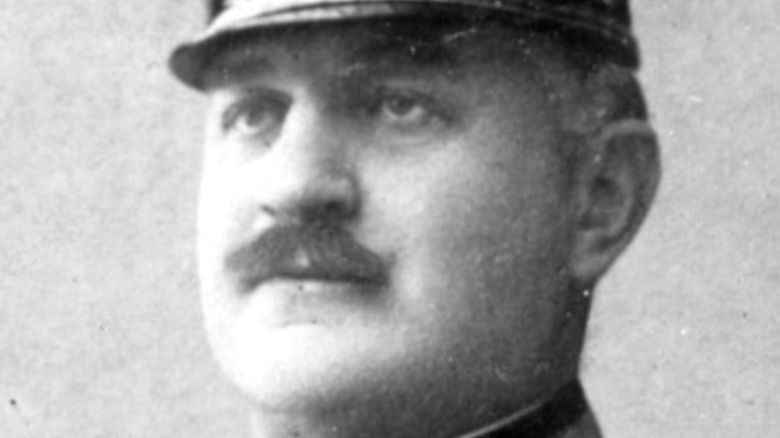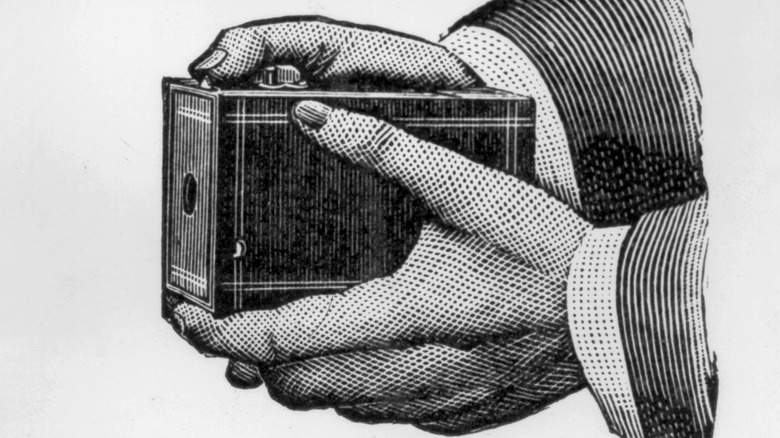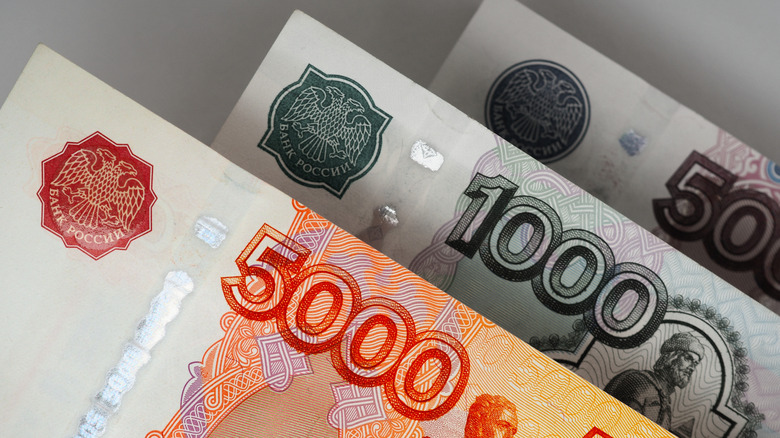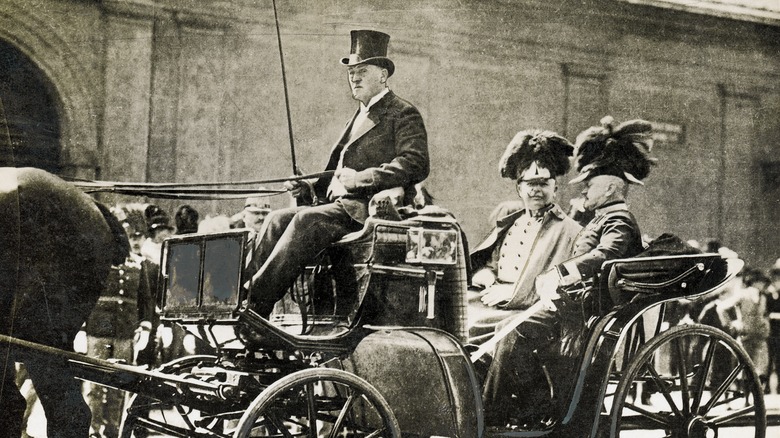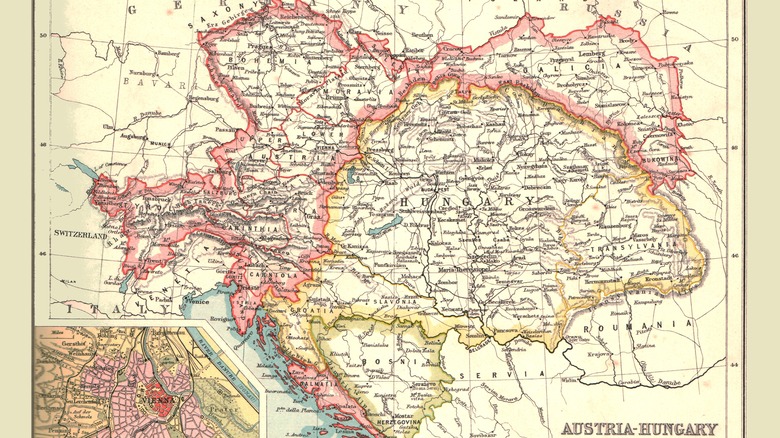Inside The Story Of The Austro-Hungarian Double Agent Who Took Down The Empire
In the early 20th century, an Austrian officer who had worked up his way the military's chain of command found himself in a predicament where he would have to aid one of his empire's greatest threats. Alfred Redl was the chief of intelligence for the Austrians, and simultaneously the chief spy in the Austro-Hungarian Empire for the Russians. Having a knack for counterintelligence, when his homosexuality had been uncovered by the Russian empire, Redl was forced into being a spy for Russia in exchange for keeping his secret, according to History Collection.
Redl gave the Russians very valuable information on the Austrian empire, including things such as the Austrian war plans, reports on infrastructure, military maps, but also fed the Austrians false information on the Russians (via War History). Some believe that largely due to Redl's influence, he inevitably cost the Austro-Hungarian Empire victory in World War I that ultimately brought about the downfall of the empire.
The early life of Alfred Redl
Alfred Redl was born on March 14, 1864, in Lemburg, Austria. He did not have much growing up, being the son of a railway clerk, but began traveling when he became a young adult, and he proved to be exceptionally adept at learning and adopting other languages, according to Britannica. With ambitions to be an officer, Redl applied for the War School of Vienna, which only accepted 50 candidates at a time, usually reserved for men of noble or prestigious backgrounds, according to War History. Surprisingly, Redl was accepted into the school, and quickly demonstrated that he was more than capable.
Redl specialized in Russian internal affairs, and joined the Intelligence Bureau of the Austro-Hungarian General Staff, where he caught the eye of General Arthur Freiherr Giesl von Gieslingen, chief of the military intelligence, according to History Collection. Gieslingen became Redl's mentor, and made Redl his deputy, along with being the head of the Austro-Hungarian counterintelligence corps (via the History Collection).
Blackmailed into Treason
Alfred Redl heavily improved upon the Austro-Hungarian Empire's counterintelligence programs, and utilized new technologies at the time, such as cameras and sound recording devices, along with adding organization to the heavily discombobulated branch, according to History Collection. Redl also employed a fingerprint registration system, which allowed him to collect important information on people who were considered assets to his counterintelligence operations (via War History). But Redl's career was about to take a dramatic turn, when Russian spies uncovered one of Redl's most important, personal secrets.
Russian intelligence discovered that Redl was homosexual, and after collecting evidence via camera, the Russians blackmailed Redl. They offered Redl money, along with promising not to reveal the secret of Redl's homosexuality, as long as Redl sold out his country and gave secrets to the Russians. Redl agreed with the deal, and began his career as a double agent (via History Collection). Redl sold the Austro-Hungarian Empire's war plans to the Russians as one of his first dealings, and Redl's mentor, General Arthur Freiherr Giesl von Gieslingen, ordered the now-double-agent Redl to investigate the situation, according to War History.
Playing both sides
Over the next couple of years, Redl sold a variety of secrets from the Austro-Hungarian military to the Russians. The Russians were given such secrets as reports on Austrian infrastructure, such as railways and road conditions, army orders, and maps (via History Collection). But one of the most valuable secrets Redl sold the Russians was the Austro-Hungarian Empire's Plan III, which detailed an invasion of Serbia, according to War History. When World War I broke out with the assassination of Archduke Franz Ferdinand, the Austrians attempted to invade Serbia, but were repelled due to the Serbian knowledge of the invasion beforehand (via War History).
Redl did his best to remain unnoticed by the Austrians that he was playing both sides, and often had minor Russian spies locked up, along with framing officers in the Austro-Hungarian military as traitors, according to History Collection. Redl simultaneously gave the Russians details on Austrian war plans, along with providing the Austrians with inaccurate information on the Russian military, according to War History.
Uncovered!
In 1912, Alfred Redl faced his downfall. Major Maximilian Ronge, a protégé of Redl's, came across an envelope that contained money, which was to be delivered to an address used by the espionage program to a man named Nikon Nietzas. Ronge then created a duplicate envelope, and had it delivered to the post office of the same address to uncover who the secret spy was. Ronge had agents stake out the post office, and someone finally came to claim the letter. However, the man got away in a taxi before his identity could be uncovered, according to War History.
Eventually, the taxi returned, and Ronge's agents ordered to be taken to the place that the taxi driver dropped off his last customer. The location was the Klomser hotel, and after finding a sheath that was accidentally dropped in the cab, the agents took the lost item and brought it into the building with them. The agents gave the sheath to the hotel workers, and sat in the lobby until someone claimed it; that someone was none other than Alfred Redl.
Redl's Legacy
When Alfred Redl was discovered to be a double agent, he was arrested for treason. Disgraced, Redl was approached by the Austrian Chief of Staff, Conrad von Hötzendorf, who suggested that Redl should take a revolver and kill himself. (Other accounts relate that Redl himself requested the weapon, in order to kill himself.) After writing farewell letters, Reidl shot himself on May 25, 1913, according to Britannica. But even though Redl's death might have stopped information from being given to the Russians, it caused the Austro-Hungarian Empire some serious blowbacks during World War I, and ultimately, its dissolution.
Given how Redl gave the Russians information on Austrian war plans, the Russians were prepared for any scenario they were faced with, which helped them defeat the Austrians in World War I. In 1919, the Treaty of Saint-Germain was signed which effectively ended the Austro-Hungarian Empire. The nation was divided up into smaller entities, and left Austria in a weak state, according to Britannica. It is no doubt that Redl had a serious effect on the Austrian war capabilities, and perhaps if he had not risen to such heights of power, the world today would be a much different place.
